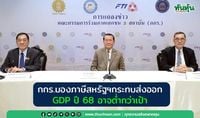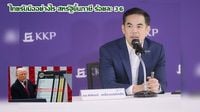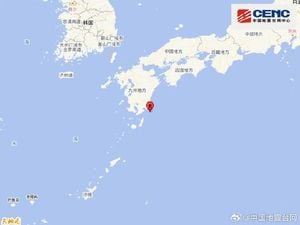The Joint Standing Committee on Commerce, Industry, and Banking (JSCCIB) convened recently to address the pressing economic challenges facing Thailand, particularly in light of the recent announcement regarding Reciprocal Tariffs by the United States. During their April meeting, the committee expressed solidarity with volunteers and agencies aiding earthquake victims while also framing the current situation as a "moment of opportunity" to bolster confidence amid global uncertainties.
As the U.S. ramps up its trade policies, the JSCCIB highlighted the potential repercussions these Reciprocal Tariffs could have on Thailand’s trade landscape. These tariffs, alongside Specific Tariffs, are anticipated to impact trade relationships significantly, particularly with nations that have favorable trade balances with the U.S. The committee emphasized the necessity of integrating efforts between governmental and private sectors to effectively navigate these challenges.
According to the JSCCIB, Thailand's economic growth is projected to fall within the range of 2.4% to 2.9% for the year 2025. However, this forecast is fraught with uncertainty, as the committee noted that the new tariffs could further reduce GDP growth by an additional 0.2% to 0.6%. The committee's concerns reflect a broader anxiety about the impact of U.S. trade policies on the Thai economy, particularly in sectors heavily reliant on exports.
In a detailed analysis, the JSCCIB pointed out that Thailand is particularly vulnerable to U.S. tariffs due to its significant trade surplus with the United States. With 2,881 items subject to higher tariffs than those imposed by the U.S., representing 55% of the total compared items, the repercussions of these tariffs could be severe. Industries such as electronics, automotive, and petrochemicals are likely to face heightened risks as a result of these policies.
Furthermore, the committee underscored the importance of transparency in the data regarding the safety of buildings and structures following the recent earthquake. They believe that openly sharing this information could help restore confidence among both domestic and international stakeholders, including tourists and investors.
"We must use this moment to build understanding across all sectors about the impact of these tariffs and the broader economic implications," stated a representative from the JSCCIB. The committee is calling for immediate action to prepare for the potential impacts of U.S. trade policy and to foster resilience within the Thai economy.
Meanwhile, the U.S. has been moving towards implementing Reciprocal Tariffs as part of a broader strategy to address perceived unfair trade practices by its partners. The announcement made by former President Donald Trump in February 2025 at the White House Rose Garden marked a significant escalation in trade tensions. The U.S. Reciprocal Trade Act, which aims to impose tariffs on countries that charge higher rates than the U.S., could lead to substantial shifts in trade dynamics.
According to the White House Office of Trade and Manufacturing Policy, Thailand is among the countries identified as having non-reciprocal trade relations with the U.S. The data indicates that if Thailand were to align its tariffs with those of the U.S., the trade deficit between the two nations could decrease significantly. Specifically, reducing Thailand's tariffs to match U.S. levels could lower the deficit by approximately $3.2 billion, or 17% of the total trade deficit recorded in 2018.
Conversely, should Thailand maintain its current tariff levels while the U.S. raises its tariffs to match Thailand's, the trade deficit could decrease even more dramatically, by about $6.4 billion, which accounts for 34% of the total trade deficit for that year. This stark contrast highlights the critical nature of tariff negotiations and the potential economic fallout from the U.S. trade policies.
In light of these developments, the JSCCIB is urging the Thai government to take proactive measures to mitigate the risks associated with these new tariffs. They recommend implementing short-term policies aimed at cushioning the economy from external uncertainties while also focusing on long-term strategies to enhance the country’s competitive edge.
Another point of concern raised during the meeting was the proposed restructuring of natural gas pricing in Thailand. The committee expressed apprehension that shifting the cost burden of gas prices onto the industrial sector could lead to a nearly 60% increase in industrial gas prices, significantly impacting production costs. The JSCCIB advocates for a thorough examination of the implications of such a policy shift, emphasizing the need for a balanced approach that considers the interests of all stakeholders involved.
As Thailand grapples with these multifaceted challenges, the committee remains committed to fostering a resilient economic environment. By encouraging collaboration across sectors and ensuring transparency in data sharing, they hope to instill confidence in both the domestic market and among foreign investors.
In summary, the JSCCIB's recent meeting underscored the critical intersection of trade policy and economic stability in Thailand. With the looming threat of U.S. tariffs and the ongoing recovery from natural disasters, the committee's call for unity and proactive measures may prove essential in safeguarding the nation’s economic future.






